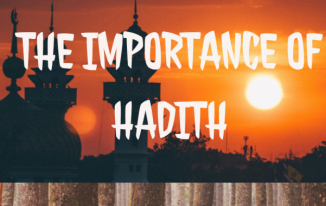In this article we will learn What is Hadith? And also we will learn about Collection, Importance and Authentication of Hadith. Insha Allah
Definition of Hadith
Hadith is purely and simply the sayings and teachings of the Holy Prophet Muhammad (PBUH). The teachings and sayings of the Holy Prophet (PBUH) have been narrated by the companions of the Holy Prophet Muhammad (PBUH). After the demise of the Holy Prophet Muhammad (PBUH), the narrators of Hadith decided to collect and compile the sayings of the Holy Prophet (PBUH) for the future Ummah.
Therefore, the Hadiths were collected and compiled only after being authenticated in order to make sure that the hadiths are genuine. Today the most well-known, most reliable and genuine hadith is the Sahih Bukhari.
What is the importance of Hadith in Islam?
Hadith plays a vital role in Islam. Hadith is the book of teachings and sayings of the Holy prophet Muhammad (PBUH) where the verses of the Holy Quran are explained explicitly to mankind. At the time of his prophethood, Prophet Muhammad (PBUH), was continuously received revelations, he was interpreting and explained the revealed verses to his companions.
For instance, when he went for Al- Isra, the Ascension to heaven, he brought back to mankind the five mandatory prayers. The verses were revealed about the daily prayers and Muhammad (PBUH) was the only one who explained to the people of Mecca how to perform the prayers steps by steps. In other words, if the hadith was not there, the Quran would have been meaningless to the Muslim’s Ummah.
Another example would be whereby, Allah has revealed to Prophet Muhammad (PBUH) about the five pillars of Islam. In the Holy Quran, the verses were merely commands from Allah to mankind. The hadith explains clearly what Zakat – Charity, is for example, Sawm – Fasting and Hajj – Pilgrimage. In fact the Hadith explains how to offer fasting in the month of Ramadan such what is allowed and prohibited during the state fasting. Furthermore, the hadith also explains about the payment of Zakat explicitly and the rate that needs to be paid towards the needy. Moreover, the rites of pilgrimage is outlined and clearly explained in the Hadith.
Therefore, the hadith itself is a key element to all the Muslims across the world as it is the only guide left after the demise of the Holy Prophet (PBUH) to mankind. In short, the hadith compliments the Holy Quran as it is the best interpretations of Allah’s words addressed to mankind through the Holy Prophet Muhammad (PBUH).
All Muslims across the world follow the teachings and sayings of the Holy prophet Muhammad (PBUH) through the Hadith.
How and were the Hadith collected, compiled and authenticated?
Sadly after the demise of the Holy Prophet Muhammad (PBUH), the companions of the Holy Prophet Muhammad (PBUH) continued to propagate Islam and the practices of the Holy Prophet (PBUH) through their caliphates. In fact they realised that the hadiths were not preserved in any form and they were concerned about the future Ummah.
Therefore, they decided to start collecting all the teachings of the Holy Prophet (PBUH) for compilation. It took years and decades to accomplish this noble task.
Nevertheless, the narrators of the Hadiths were very cautious about the authenticity of the Hadiths and therefore before accepting any Hadiths for any transmitters, their characters were investigated in terms of their reliability and integrity. If there were any doubts at any time, the hadiths were rejected. Only strong hadiths were accepted which were known ‘Saheeh’ – genuine. For examples, the Hadith of Imam Bukhari and Imam Tirmizi.
Hadiths are key to the teachings of Islam
According to the Holy Quran, the teachings and sayings of the Holy Prophet Muhammad (PBUH) are limitless; however some of the quotes will be shared below:
-
And Whatever the Messenger gives you, accepts it, and from whatever he forbids you, abstains from it (Quran 59: 7).
-
Say: If you love Allah then follow me and Allah will love you and forgive your sins (Q. 3: 31).
-
Whoever obeys the messenger has obeyed Allah (Quran 4: 80).
-
O you who believe, obey Allah and obey the Messenger and those in authority among you. If you differ in anything, then refer it to Allah and His Messenger if you believe in Allah and the last day; that is better and the best interpretation (Quran 4: 59).
Examples of the Holy Prophet’s ( PBUH) sayings:
-
Those people who show no mercy will receive no mercy from Allah” (Sahih Muslim).
-
Not one of you can (truly) believe if you do not want for your (believing) brother what you want for yourself” (Bukhari).
-
Do not have ill-will towards one another, do not be envious of one another, do not turn your back on one another; O, servants of Allah, be brothers (and sisters). It is not permissible for a Muslim to remain angry with their brother [in religion] for more than three days (Sahih Bukhari).
-
When a human being dies all their actions and blessings come to an end, except for these three things: continuous charity, the knowledge from which they have benefited others, and a blessed child who prays for them” (Sahih Muslim).
-
If someone conceals the mistake of another servant on the Day of Judgement Allah will cover their mistake” (Sahih Muslim).
Conclusion
The sayings and teachings of the Holy Prophet (PBUH) known as Hadith is the second reliable source for all the Muslims to follow and practise Islam. It is the only guide left and the best gift from the Prophet Muhammad (PBUH) given to mankind in order to have an Islamic lifestyle and to adhere to the commands of Allah as prescribed in the Holy Quran.
In short, the Holy Quran is meaningless to mankind without the teachings and sayings know as hadiths of the Holy Prophet Muhammad (PBUH).
